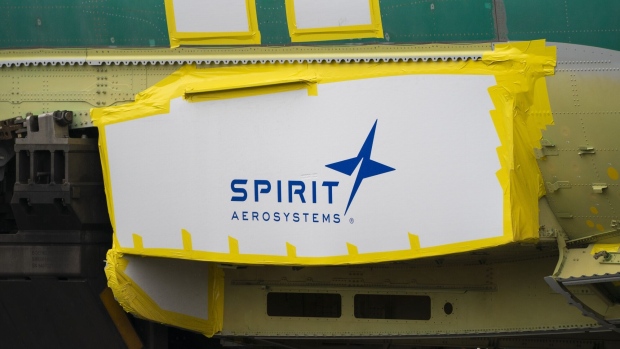Mar 2, 2024
Boeing Bets Big On Spirit Aero With 737, Reputation On the Line
, Bloomberg News

(Bloomberg) -- Days after US regulators gave Boeing Co. a 90-day ultimatum to address quality lapses in its jets, the planemaker’s response is coming into focus — and it involves what stands to be its most consequential strategic move in years.
Boeing confirmed it is in preliminary talks to acquire former division Spirit AeroSystems Holdings Inc., the supplier at the center of a spate of recent quality issues affecting the 737 Max airliner. A deal would reunite assets that once sat under one roof, bringing together thousands of workers and decades of shared expertise, and allow the aerospace giant to tighten oversight over its most important parts provider.
“We believe that the reintegration of Boeing and Spirit AeroSystems’ manufacturing operations would further strengthen aviation safety, improve quality and serve the interests of our customers, employees, and shareholders,” Boeing said in a statement Friday, while noting there was no guarantee the two sides would reach a deal. Spirit separately confirmed the discussions.
A takeover would mark Boeing’s biggest acquisition since at least 2018, when it bought aircraft-parts distributor KLX Inc. for about $4.2 billion shortly before two fatal crashes and the Covid pandemic sent the company into a tailspin. For Chief Executive Officer Dave Calhoun, buying Spirit would bring a key supplier for the 737, 787 Dreamliner and other commercial jets in-house and also be a step toward addressing a deepening challenge: a crisis of confidence.
The company’s leaders have faced scrutiny from angry customers, regulators and lawmakers since a harrowing near-miss in January when a fuselage panel blew out of an airborne Alaska Airlines Max 9 jetliner. While Spirit built the airframe and door plug in question, investigators later determined the jet was delivered to Alaska from Boeing’s factory without four fasteners needed to lock the section in place.
Rumors have swirled for months that financially struggling Spirit might be reunited with its former parent, but Calhoun was quick to dismiss the speculation — until recently. Now some analysts say he didn’t have much choice but to follow through.
The Federal Aviation Administration is close to wrapping up its audit of manufacturing practices at both companies. On Feb. 25, it issued a bruising review of Boeing’s safety culture, mandated by Congress and carried out by a panel of aviation experts. Now, Calhoun and other executives could soon face a public grilling before Congress with Senator Maria Cantwell, the Washington Democrat, vowing to hold hearings.
“This is a small but critical deal for them,” said Jeffrey Sonnenfeld, senior associate dean for leadership studies at the Yale School of Management.
Spirit shares jumped 15% Friday to close at $32.98, giving the company a market value of about $3.8 billion. The supplier has already begun unraveling the diverse business it has created since 2005, when Boeing spun off its Wichita, Kansas-based division to a private equity firm.
Spirit is separately exploring selling some of its manufacturing for Airbus SE, including a Northern Ireland division that makes carbon-fiber wings for the A220 jets, according to people close to the discussions. The European planemaker is among the potential buyers, said the people, who asked not to be identified because the talks are confidential.
The Boeing-Spirit talks were “a surprise,” said George Ferguson, an analyst with Bloomberg Intelligence. “If they could’ve found a way to leave Spirit outside of Boeing, they would have.”
Buying back Spirit likely wouldn’t dent Boeing’s finances or dilute its stock, Ferguson said. While the industrial titan has around $16 billion in cash and short-term securities, he said Boeing and Spirit are likelier to forge a stock swap. Doing so would dilute Boeing’s 610 million shares by about 4% near term, but would pay off for investors if the end result is a stable production system with higher output of Boeing’s cash cow 737 and 787 jets.
“I don’t think you have to motivate Spirit shareholders at this point,” Ferguson said.
‘Final Admission’
Spirit’s divestiture by Boeing ended almost 80 years within the US planemaker’s fold. The move was part of Boeing’s drive under then-CEO Harry Stonecipher to shed assets and ultimately become more profitable. But in recent years, the contractor struggled with worker turnover and money-losing contracts before bringing in as its CEO Pat Shanahan, a former Boeing executive notable for helping turn around the 787 Dreamliner after a troubled start.
A Spirit takeover “would likely be the final admission that BA’s two-decade-long outsourcing strategy has not yielded desired results,” Citigroup Inc. analyst Jason Gursky wrote in a note to clients, referring to Boeing by its stock symbol.
Airbus has also moved some suppliers of its airplane structures back in-house. Boeing is Spirit’s largest customer, accounting for 64% of the supplier’s revenue last year. Airbus was its second-biggest, with 19%.
But even if Spirit sells its Airbus-related businesses, a tie-up with Boeing will likely face close scrutiny by antitrust regulators and the Pentagon, given the Kansas company’s role in programs like the B-21 bomber.
It’s not a given that approvals will quickly fall into place, especially given the skepticism around vertical integration voiced by Federal Trade Commission Chair Lina Khan. In a recent CNBC interview, she warned of the risk of consolidation and the idea that “it’s somehow in America’s national interests to be protecting monopolies” — and pointed out Boeing specifically.
“So, we need to be careful,” she said.
--With assistance from Ryan Beene and Brooke Sutherland.
©2024 Bloomberg L.P.


